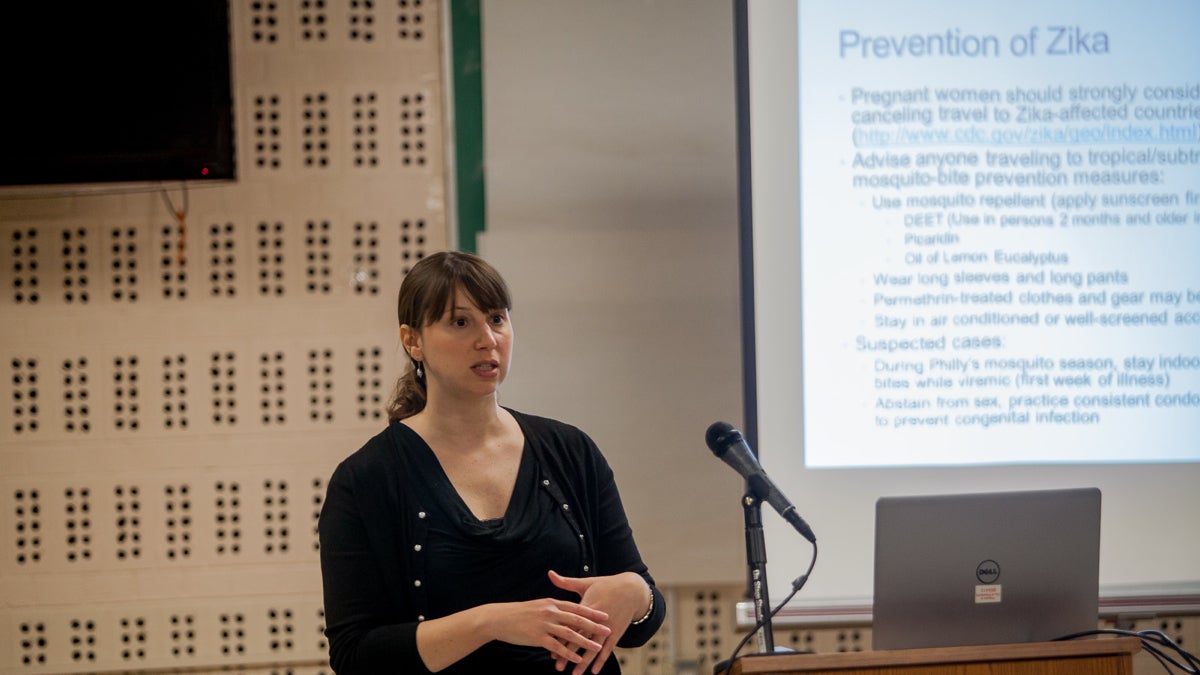Philly health workers prep for possible Zika cases

Dana Perella, the vector-borne disease surveillance coordinator for the city's Department of Public Health, leads a meeting on preventing the spread of the Zika virus should it make its way to Philadelphia. (Brad Larrison/for NewsWorks)
The recent outbreaks of the mosquito-borne Zika virus in areas of the Americas and Caribbean have Philadelphia health workers prepping for any possible impacts in this region.
U.S. cases typically involve a traveler going where the virus is spreading and then coming back infected.
Philadelphia has identified no such cases, Dana Perella briefed several dozen health department staff earlier this week. Perella, who oversees viral monitoring for the city, said, even so, the department is prepping for the possibility by communicating with hospitals and reviewing screening and monitoring guidelines.
Testing still takes place in the Centers for Disease Control and Prevention’s Fort Collins laboratory. Providers, she said, will want to be aware of patients who present with two or more of the virus’ symptoms — a fever, a rash, joint pain, conjunctivitis — and have a history of travel within two weeks to Zika-affected areas.
Most people infected with Zika don’t show symptoms, but scientists worry that it may be responsible for thousands of cases of microcephaly, a serious birth defect, among newborns of Zika-infected moms in Brazil. There are currently no vaccines or curative treatments, so avoiding mosquitoes has been a main priority.
While there are still a lot of unknowns with Zika, Perella says surveillance in Philadelphia would be similar to that of chikungunya and dengue, viruses that are also spread from mosquitoes to hosts and then to other mosquitoes who bite those hosts.
When parts of the Americas saw spikes in those viruses a few years ago, Philadelphia experienced 42 cases of chikungunya in 2014 and 11 cases of dengue in 2013.
Meanwhile, the Philadelphia region does not have the mosquito, Aedes aegypti, that carries Zika.
“We’re happy about that,” said Ray Delaney, who oversees vector control services for the city.
A close relative to that mosquito, called Aedes albopictus, however, is common throughout the region (which can carry chikungunya and dengue viruses). It’s unclear whether this type of mosquito could result in Zika outbreaks, but Delaney said it’s enough for his department to update preparedness plans and amp up ongoing mosquito testing and monitoring efforts.
“Mosquito activity in Philadelphia is seasonal,” he said. “We start dipping for our first larva in April, and, hopefully, with that cold hard frost in October, our season comes to an end.”
Delaney said the region has a robust control program in place, thanks to dealing with West Nile virus. It means that come April, city crews will start applying larvicide to more than 40,000 stormwater inlets where mosquitoes are known to breed. They’ll also set up traps, respond to mosquito complaints (they usually receive 100 to 300 a year), and launch education and prevention programming.
“The best way to eliminate mosquitoes, especially in the city, is through source reduction — getting rid of standing water areas,” he said, pointing to water in gutters or even in kids’ toys that are left outside as examples. “Eliminating that helps us tremendously, and helps them [people] too. Mosquitoes only go as far as they have to, to get a bite.”
WHYY is your source for fact-based, in-depth journalism and information. As a nonprofit organization, we rely on financial support from readers like you. Please give today.

